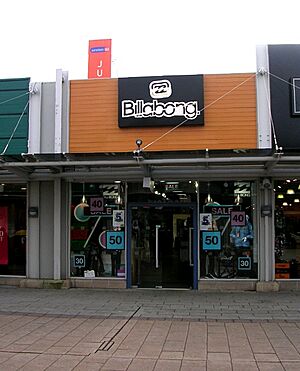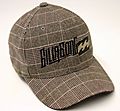Billabong (clothing) facts for kids
 |
|
| Subsidiary | |
| Industry | Textile |
| Founded | November 6, 1973 in Gold Coast, Queensland, Australia |
| Founder | Gordon Merchant |
| Headquarters | Burleigh Heads, Queensland, Australia |
|
Key people
|
David Tanner (CEO) |
| Products | Boardshorts, wetsuits, t-shirts, shirts, backpacks |
| Revenue | |
|
Number of employees
|
~6,000 (2011) |
| Parent | Authentic Brands Group |
Billabong International Limited is an Australian company. It mainly sells clothes for surfing and skateboarding. They also make accessories like watches and backpacks. The company was started in 1973 by Gordon and Rena Merchant. The name "Billabong" comes from an Australian Aboriginal word. It means a creek that flows only when it rains.
Billabong owns several other popular brands. These include Von Zipper, Element, Kustom, and RVCA. In 2018, another company called Boardriders, Inc. bought Billabong. Boardriders also owns a rival brand called Quiksilver.
For a few years, starting in 2012, Billabong faced some challenges. The company's sales went down. But they worked hard to improve. By 2014, Billabong was making a profit again.
Contents
History of Billabong
How Billabong Started
Billabong began in 1973 in Gold Coast, Queensland, Australia. Gordon and Rena Merchant started the company from their home. They designed and made board shorts. Then, they sold these shorts to local surf shops. Surfers quickly noticed how strong and long-lasting the shorts were. This was because Rena used a special triple-stitching method.
Billabong started to support surfing competitions. This helped more people learn about their products. The company grew bigger. By the 1980s, Billabong board shorts were popular all over Australia.
Growing Around the World
Because of their success in Australia, Billabong decided to sell its products in other countries. By the late 1980s, Billabong board shorts were available in New Zealand, Japan, and South Africa. In the 1990s, the whole surf industry became much larger. Billabong was a big part of this growth.
In 2000, the company's shares were first sold on the Australian stock market. This helped Billabong get money to grow even more. They also started to buy other companies.
Buying Other Brands
As Billabong grew, it bought new brands and stores. This helped them sell products directly to customers. The early 2000s were a busy time for Billabong's expansion.
- In 2001, they bought Von Zipper, a company that makes eyewear.
- Also in 2001, they acquired Element, a brand known for skateboarding clothes and gear.
- In 2004, Billabong bought the Kustom surf shoe brand. This was part of buying the Palmers Surf company.
- In 2005, they announced buying Nixon Inc. This brand makes watches and accessories for board sports.
Billabong continued to add more brands.
- In 2007, they bought Xcel, a company that makes wetsuits.
- They also acquired Tigerlily, a brand focused on clothes for girls. This was Billabong's first time buying a brand just for the 'girls' market.
In 2008, Billabong bought four more companies in just four months.
- They bought Kirra Surf, a store on the Gold Coast.
- They also acquired Quiet Flight, a retail company in the United States. This added 14 new stores, mostly in Florida.
- In June 2008, they bought Sector 9, a skateboard company. This deal also included the Gullwing skateboard truck brand.
- Finally, in August, Billabong bought DaKine. This company specializes in backpacks, bags, and gloves.
Billabong kept expanding its retail stores. In November 2008, they bought Two Seasons, a chain of 13 stores in the United Kingdom. In 2009, Billabong bought Swell, an online store for board sports brands in the US.
In 2010, Billabong signed a deal with Plan B, a popular skateboard company. Plan B then partnered with Element. Billabong also continued buying more retail stores.
- In May 2010, they bought Becker Surf and Sport, an American surf retailer.
- In June, they bought West 49, a Canadian action sports retailer.
- In July, they acquired RVCA, an apparel brand. The founder of RVCA liked that Billabong respected each brand's unique style.
- In October, Billabong bought the Australian retail stores Surf Dive ‘n' Ski and Jetty Surf.
Challenges and Changes
In 2012, Billabong faced big challenges. The company decided to make major changes. They closed many stores and reduced jobs around the world. They also sold part of their Nixon brand to help pay off debt.
Several companies tried to buy Billabong during this time. Gordon Merchant, who owned a large part of the company, turned down some offers. In August 2012, the new chief executive, Launa Inman, shared a plan to help Billabong grow again. The plan focused on making the business simpler and improving its online sales.
New Ownership
The process of finding a new owner for Billabong was long and complicated. In 2013, after many offers and discussions, Billabong finally agreed to a deal. Two US investment firms, Centerbridge Partners and Oaktree Capital, became major owners of the company. They also appointed a new chief executive, Neil Fiske.
In November 2013, Billabong sold its Canadian retail chain, West 49, to YM Inc. This deal included 92 West 49 stores across Canada. In January 2014, Oaktree Capital Management and Centerbridge Partners took over more of Billabong's debt. They gained a large ownership stake in the company. Billabong also sold its shares in SurfStitch and Swell.
Back to Being Profitable
Billabong was publicly listed in 2000. Its sales grew a lot, reaching A$1.7 billion in 2011. The company made good profits in 2007. However, by 2011, their profits dropped significantly.
In 2013, Billabong reported big losses. The value of the Billabong brand itself was even considered almost worthless at one point. But the company worked hard to turn things around. In 2015, for their 2014 financial reports, Billabong finally made a profit again. This was the first time they were profitable since 2011.
In April 2023, Authentic Brands Group made an offer to buy Boardriders, Inc. This company owned many well-known brands, including Quiksilver, Billabong, Roxy, RVCA, DC Shoes, Element, Von Zipper, and Honolua. The deal was completed in September 2023.
Liberated Brands Bankruptcy
On February 2, 2025, Liberated Brands, which owned Billabong retail stores in the US, filed for bankruptcy. The company announced that all remaining Billabong stores in the US would close. Sales to clear out inventory began a week before the bankruptcy filing. The ownership of the Billabong brand itself still belongs to Authentic Brands Group.
Awards
In 2009, Billabong was recognized as one of the "Q150 Icons" of Queensland. This award celebrated its role as an important "innovation and invention" from the region.
Teams
Billabong supports teams of athletes in different sports. These athletes act like ambassadors for the brand and the lifestyle it represents. Billabong sponsors many surfers, as surfing continues to be very popular.
See also
 In Spanish: Billabong para niños
In Spanish: Billabong para niños
- Billabong Pro Jeffreys Bay
- Billabong Pipeline Masters
- Billabong Pro Teahupoo
- Billabong XXL
- Tribal Gear
Images for kids
-
A Billabong brand baseball cap.



